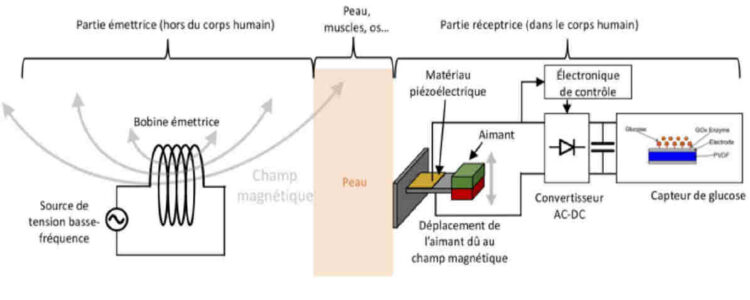Period, duration
March-August 2023, 20 weeks
Profile required
Master2 or engineering school student in electronics, electrical engineering, mechatronics, applied physics
Bonus
4.05/h (standard)
Location
Annecy-le-vieux ; Maison de la mécatronique ; Symme laboratory
Subject
Context:
In many applications, deploying cables and using batteries to power sensors can be particularly complex. When it comes to powering biomedical systems in the human body (e.g. pacemakers, optogenetic devices, glucose sensors, etc.), changing a battery is an expensive, complex and potentially dangerous surgical procedure.
In order to replace batteries for powering these in-vivo biomedical systems, one promising solution is to transfer energy wirelessly to a receiver placed inside the human body. An electronic circuit connected to this receiver will condition and store the electrical energy in a capacitor or rechargeable battery.
To transfer energy safely and efficiently through the human body (which is mostly composed of water), it is preferable to use low-frequency magnetic waves. To this end, an original low-frequency energy transfer system has been developed at the SYMME laboratory, in collaboration with CEA-LETI (Grenoble).
A transmitter (placed outside the human body) consisting of a large coil is powered by a low-frequency AC voltage source. The alternating current flowing through the coil generates a low-frequency alternating magnetic field. This alternating field causes a magnet attached to a beam to move at the level of the receiver placed in the human body. The beam begins to oscillate, deforming a piezoelectric material bonded to it. The deformation of the piezoelectric material generates an AC voltage at its terminals, which can be rectified and conditioned to charge a capacitor powering, for example, a glucose sensor.
Required work :
The aim of the internship is to design a power electronics system that optimally recovers and conditions energy from the receiver. After reviewing the literature on wireless energy transfer, the trainee will model the system (e.g., in Matlab and Simulink, or in Python), taking into account the magnetic, mechanical and electrical aspects of the complete system. The trainee will then be able to validate his or her model with experimental measurements on a dedicated test bench. In the second part, the trainee will design the electronics needed to recover and condition the energy from the receiver in the best possible way. The trainee will develop power electronics (AC-DC and DC-DC converters) as well as analog control electronics to drive and optimize these converters. Ambitious and original solutions may be explored, for example by designing electronics capable of adjusting the receiver's mechanical resonance frequency, or by exploring the possibility of transmitting energy and information simultaneously on the same channel. Finally, the trainee will test the electronics thus developed on a prototype wireless energy transfer system from the laboratory.
The intern will develop skills in multi-physics modeling, system-level optimization, low-power analog electronics design, and power electronics. He/she will be integrated into a team with expertise in modeling, design and development of solutions for energy recovery and transfer, at the SYMME laboratory (Annecy), and will have the opportunity to take part in discussions and collaboration with a partner laboratory, CEA-LETI (Grenoble). He/she should have good analytical skills, a profile in electronics, power electronics, applied physics or mechatronics (at least one of these fields), and an appetite for solving transdisciplinary technical problems, ranging from multi-physics systems to electronic design. Depending on the progress of the internship, the results obtained by the intern may be published as a scientific article in a peer-reviewed journal.
Contact
Adrien.Morel
@univ-smb.fr
Project team
Adrien Morel, teacher-researcher IUT-A / SYMME
David Gibus, teacher-researcher POLYTECH A-C / SYMME
Adrien Badel, teacher-researcher POLYTECH A-C / SYMME
Ludovic Charleux, teacher-researcher POLYTECH A-C / SYMME
Emile Roux, teacher-researcher POLYTECH A-C / SYMME
Nicolas Garraud, research engineer CEA-LETI
Pierre Gasnier, research engineer CEA-LETI
